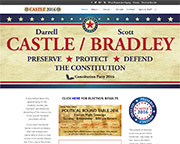- P2016 Home « Declared
2016
Presidential
Candidate « Darrell Castle
Conventional Wisdom
Strengths
- A candidate that takes as his starting point adherence to the Constitution.
Weaknesses
- Unknown, ignored by the mainstream media, and running with very little funds.
Notes, Coverage and Speeches
-Acceptance speech at the Constitution Party 2016 Presidential Nominatingl Convention in Salt Lake City, UT, April 16, 2016.
In 2015 Darrell Castle had begun preparing to run for the Constitution Party presidential nomination when he was diagnosed with melanoma, necessitating surgeries on his back and then his leg. He largely wrote off the idea of a campaign, but by March 2016 doctors gave him a clean bill of health. A draft movement developed, things all came together pretty quickly, and he won the nomination at the party's national convention in Salt Lake City in April 2016. In his acceptance speech Castle identified "three legs of the program to save the Republic": getting out of the "Supranational Order," ending the Federal Reserve, and solving the debt problem. Another part of his platform was his strong pro-life position. For his running mate, Castle chose Scott N. Bradley, a business owner from Northern Utah.
As with other third party campaigns, ballot access posed an immediate hurdle, and the Castle campaign had successes and disappointments. In Ohio, where signatures from 5,000 qualified electors were required, a paid signature gatherer produced about 8,500 signatures but not enough were valid and the campaign had to settle for write-in status. Tennessee ended up as a write-in state. On the bright side, the campaign achieved ballot access in Hawaii. Ultimately, Castle appeared on the ballot in 24 states with official write-in status in 22 states.
The campaign had three objectives: to win, to get its message out, and to grow the party. The political terrain seemed favorable; leading the major parties were the ever unpopular Clinton and Trump. In addition to Constitution Party activists, Castle gained some backing from supporters of Ted Cruz and of Austin Peterson, the libertarian runner up. With Bradley on the ticket, the campaign had great hopes in the Western states.
However, on Aug. 8 Evan McMullin, the 40-year old Republican congressional staffer declared his independent run. McMullin ended up focusing his candidacy on winning Utah and doing well in other western states, and this cost Castle support. He also had money, which the Castle campaign did not.
Castle continued to campaign in states where he thought he could do well. National media coverage was scarce, although he did do several interviews with Glenn Beck. On Oct. 10 Beck told VICE that he would be voting for Castle, but by the end of the month he said he was uncertain. Castle had hopes of a debate with the other third party candidates, but Gary Johnson (L) and Jill Stein (G) shied away, and the only such forum, at the University of Colorado Boulder on Oct. 25, drew Castle, Rocky De La Fuente (I) and Gloria LaRiva (PSL).
The Castle-Bradley ticket received more than 200,000 votes nationwide or about 0.15%. Given that the entire Castle campaign was conducted on a budget of less than $80,000 (not a misprint), the campaign could claim a measure of success. "We really grew a great deal," stated Joan Castle, Darrell's wife, who also served as his campaign manager. "We brought in a whole bunch of new people." By comparison the 2012 nominee Virgil Goode, who did have a modicum of name ID by virtue of being a former congressman, obtained 122,001 votes or 0.09%, and the party's best previous showing was in 2008 when the Baldwin-Castle ticket, on the ballot in 37 states, obtained 199,880 votes or 0.15%.
this
page
last revised December 19, 2016
ADVERTISEMENT


